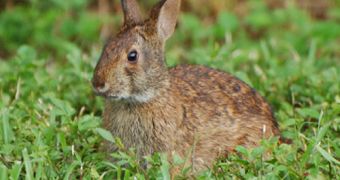Quite a while ago, the lower Florida Keys were home to a rabbit species known to science as Sylvilagus palustris hefteri. More commonly: the real Playboy bunny.
Named after Hugh Hefner, these bunnies are now facing great threats as a result of rising sea levels modifying the coastline and therefore destroying their natural habitats.
According to recent estimates, only a few hundred representatives of this species are presently left to inhabit the ecosystems in this part of the world, and given the fact that the effects of climate change are ever more visible, the situation is bound to only get worse.
A new study published by researchers working with the University of Florida states that, although this federally endangered species need concern us the most for the time being, the fact remains that other types of animals are to also be affected by the reshaping of coastlines in the not-too-distant future.
Futurity quotes Robert McCleery, specialist in wildlife ecology and conservation, who made a case of how, “We kind of look at sea level rise as this problem that’s just starting, something that is going to be a real problem for conservation in the future. But what we’re showing here is that it’s already a problem.”
Furthermore, “We’re not saying that development doesn’t have an impact, but sea level rise is undoubtedly the main culprit and development helps exacerbate it.”
Raw numbers indicate that, up until now, this species of marsh rabbits has lost as much as 64% of its habitat, and that rising sea levels need be linked to a 48% loss.
Taking into consideration the fact that many animal species now inhabiting Florida are either endangered, or on the brink of being listed as such, this comes as troubling news indeed.
As researchers emphasize, although it may be true that for the time being human society is yet to fully become aware of the effects of rising sea levels, coastline ecosystems are already beginning to be affected by it.
“Obviously, it’s already having an effect on the marsh rabbit, but in a state like Florida, with so much coastline and so many endangered species, it’s going to be a major concern for decades to come,” stated wildlife biologist Jeff Gore.

 14 DAY TRIAL //
14 DAY TRIAL //